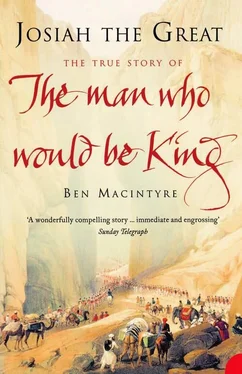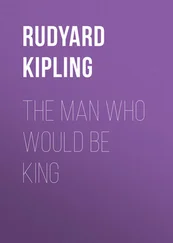Cordial but reserved, Wade invited Harlan to lodge at the residence while he made preparations for his journey. The offer was readily accepted, and having despatched a letter to Ranjit Singh by native courier requesting permission to enter the Punjab, Harlan settled down to await a reply in comfort. ‘I enjoyed the amenities of Captain W.’s hospitality,’ he wrote, noting that the Englishman ‘with the characteristic liberality of his country, extended the freedom of his mansion to all’. Over dinner, Wade explained that he maintained ‘respectful and obedient subservience from the numerous princely chieftains subject to his surveillance’ by playing one off against another. The English agent handled his delegated authority with ruthless skill, caring little what the local rulers did, to their subjects or to each other, as long as British prestige was maintained. As Kipling wrote in ‘The Man who Would be King’: ‘Nobody cares a straw for the internal administration of Native States … They are the dark places of the earth, full of unimaginable cruelty.’
Harlan was impressed by Wade’s cynical attitude to power, declaring him an ‘expert diplomatist’ and ‘a master of finesse who wielded an expedient and peculiar policy with success’. Wade in turn was intrigued by his energetic and enigmatic guest, who seemed to have plenty of money and who spoke in the most educated fashion about the local flora and classical history. Many strange types blew through Ludhiana, including the occasional European adventurer, but a mercenary-botanist-classicist was a new species altogether. Puzzled, Wade reported to Calcutta: ‘Dr Harlan’s principal object in wishing to visit the Punjab was in the first place to enter Ranjit Singh’s service and ultimately to pursue some investigation regarding the natural history of that country.’ He warned Harlan that the Company could not approve of the first part of his plan, since ‘the resort of foreigners to native courts is viewed with marked disapprobation or admitted only under a rigid surveillance’. Yet he did not try to dissuade him from heading west. In the unlikely event he survived, a man like Harlan might prove very useful in Lahore, Ranjit’s capital.
Harlan’s future was clear, at least in his own mind: he would join the maharajah’s entourage and rise to fame and fortune, while compiling a full inventory of the plants and flowers of the exotic Punjab. Like Lewis and Clark, with American bravado and learning he would open up a new world. The only hitch was that Ranjit Singh would not let him in. Although he had signed a treaty with the British back in 1809, as the greatest independent ruler left in India the maharajah was pathologically (and understandably) suspicious of feringhees, as white foreigners were called. The British were happy to let the Sikh potentate get on with building his own empire beyond the Sutlej. ‘Very little communication had heretofore existed betwixt the two governments,’ wrote Harlan. ‘The interior of the Punjab was only seen through a mysterious veil, and a dark gloom hung over and shrouded the court of Lahore.’ Which was exactly the way Ranjit Singh wanted it.
As he kicked his heels waiting for a passport that never arrived, Harlan began to form an altogether more extravagant plan that would take him far beyond the Punjab in the service of a different king, who also happened to be his neighbour in Ludhiana.
Конец ознакомительного фрагмента.
Текст предоставлен ООО «ЛитРес».
Прочитайте эту книгу целиком, купив полную легальную версию на ЛитРес.
Безопасно оплатить книгу можно банковской картой Visa, MasterCard, Maestro, со счета мобильного телефона, с платежного терминала, в салоне МТС или Связной, через PayPal, WebMoney, Яндекс.Деньги, QIWI Кошелек, бонусными картами или другим удобным Вам способом.












